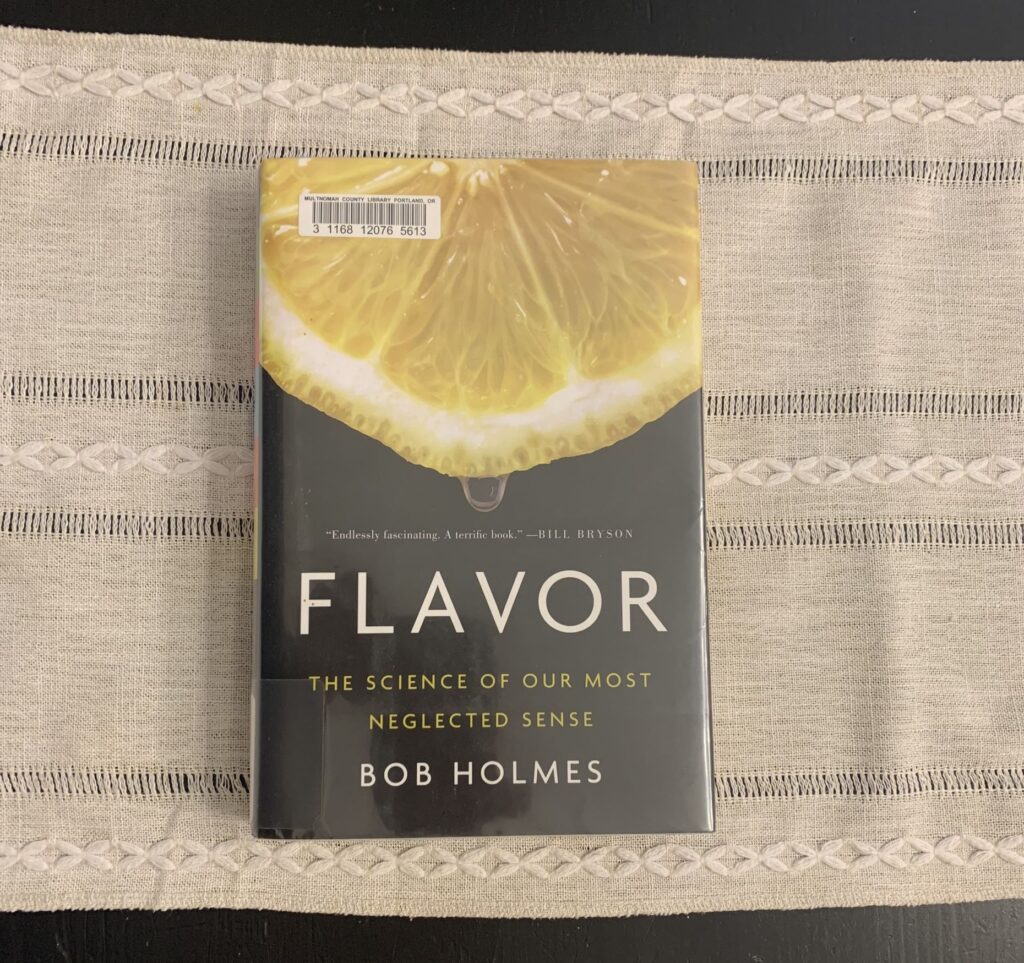Flavor was going to be an LCCBC selection for November. That is until circumstances changed but I had bought the book already. It is not a terribly long book. Even so, it took me quite a while to read with all of the interruptions of the holidays. I started it over the Thanksgiving week but finished it only a couple days ago.

The book is a combination of the fascination and the mundane. For instance, flavor is the combination of taste and scent and memory. I had never considered it before, I thought flavor and taste were actually the same thing. Memory had nothing to do with it. How fascinating.
On the contrary, some of the stories and anecdotes are repetitive in certain chapters. About two thirds of the way through the book, I was ready to give it a thumbs down due to just not enough content. But, I kept going and was rewarded with theories on developing flavor in meat and steaks.
What I learned about flavor was definitely interesting. First of all, a lot of flavor is scent. People that lose scent for whatever reason also tend to lose the ability to taste. From that point, eating is only a matter of survival and that can be a push. The author also proclaims that humans ability to detect scent is just as good as other animals (including dogs). The difference is that because we are upright, we are much farther away from most scents on the ground.
Taste is much more of a mystery. Apparently, there are 400 some taste receptors. They are specifically oriented toward specific compounds. Because there are millions of compounds, receptors have to do multiple duty or work in some sort of combination. In addition, some receptors commonly die as we age. For that reason, our preference/tolerance for certain compounds change over time. All of this work is incredibly speculative given the sensitive location of the receptors.
Flavor is the money. We all at least know somebody that cannot stand tequila or gin. The memory of the experience is a survival mechanism to keep us from accidentally poisoning ourselves. Extremely positive and negative memories from certain foods are built into our genetic responses.
It took me years to be able to smell let alone eat the Olive Garden salad dressing. When we arrived from our honeymoon in Mexico we went out to Olive Garden for dinner. I picked up a bug in Mexico that led to 105 degree temperatures amongst the polite symptoms. It was that strong vinegar component. I still loved all other high acid, vinegar forward foods but it was that particular combination (and probably setting). That memory has waned into a laugh now, but the flavor was real.
The other thing this book gets into is artificial flavoring. I am always into learning the dirty little secrets of the food industry. The biggest takeaway I got was that most real foods are way more complicated than what can be duplicated. It is not price competitive. The more a company wants to pay for flavor, the more things that can be put in to get closer to a natural flavor.
Since artificial flavoring is a compromise (even using the real chemicals we taste) there are also doppelgangers. Some flavors mimic or are similar too the real ones. This is the reason artificial grape tastes like artificial grape. The real compounds oxidize instantly and cannot be used realistically.
The most interesting and now defunct element of the book is that IBM developed artificial intelligence for food called Chef Watson. You could add an ingredient and get a suggested pairing or a couple of ingredients and get some recipes. IBM shut down Watson in 2021 but I suspect that newer technologies like Chat GPT has the same capabilities. This opens a whole new world to AI skeptics such as myself.
End Your Programming Routine: Let’s bottom line this. If you accept that there is going to be some repetition it is definitely worth the rest. As a chemist that has spent a large percentage of my career working with the food industry, I didn’t find the science overwhelming. I did find myself trying to visualize the chemical structure rather than accepting the name and moving on. Given my distance from chemical structures, I sometimes wandered off in the weeds. I don’t think a typical reader would have the same problem.
Recent Comments